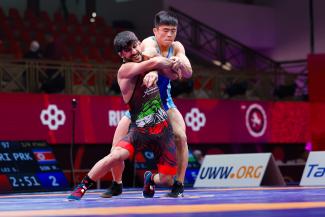China Builds 47 Million Euro Wrestling Stadium in Senegal
Thursday, July 26, 2018 - 15:46 By BBC News

DAKAR, Senegal (July 26) -- Senegalese President Macky Sall and his Chinese counterpart, Xi Jinping, inaugurated a national wrestling arena in Dakar this week in a project funded by the Chinese government.
The first arena dedicated to this popular sport in Senegal, located in the city of Pikine, near Dakar, was inaugurated Sunday, the second day of the visit of the Chinese leader in the Senegalese capital.
Xi Jinping, on a state visit to Senegal, symbolically handed Macky Sall the keys of the national arena of Pikine wrestling, during a ceremony marked by a wrestling matches and dancing.
The new arena, built in 28 months by the Chinese, cost 48.7 million euros and was paid for by the Chinese government. The stadium has a capacity of more than 20,000 places.
"The national arena fills a gap for wrestling," Senegalese Sports Minister Matar Ba was quoted by Agence France-Presse as saying.
According to Mr. Bâ the arena can accommodate other sports such as boxing and martial arts, but also socio-educational activities, such as concerts.
The national arena was always a point of concern for Senegalese wrestling professionals, who were forced to organize their competitions in football stadiums.
Lutte Senegalese is the most popular sport in the nations and often broadcast live on television, mobilize thousands of spectators and sponsors, with payment to wrestlers often reaching tens of thousands of euros for a single match.
(This story originally ran in French on the BBC, here)


Share your thoughts.
Comments